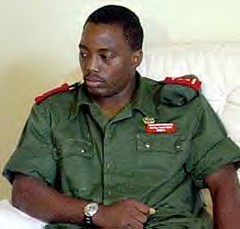
President Joseph Kabila is seeking to end the rebel activity in the eastern region of the Democratic Republic of Congo (DRC).
Originally uploaded by panafnewswire
Angola Press Agency (Luanda)
29 October 2007
The President of the Democratic Republic of Congo (DRC) has sent to Angola a special envoy that will analyse with the Angolan Head of State, the current situation in that neighbouring country.
The messenger is the Congolese Defence minister, Chikez Diemu, who arrived in Luanda this Monday.
During an audience with the Angolan Head of State, José Eduardo dos Santos, to be happen this Monday, the DRC's presidential envoy will hand over to the Angolan statesman a message from President Joseph Kabila, relating to the prevailing situation in that country.
Chikez Diemu, who did not speak to the press on his arrival in Luanda, is due back to his country still this Monday.
Meanwhile, on 25 October, the African Union (AU)'s Peace and Security Council, gathered in Addis Ababa, analysed the prevailing situation in the DR Congo.
Currently, the DRC authorities are facing an armed rebellion in the eastern part of that country, in the region of Kivu, led by the dissident general Laurent Kunda.
DRC: Refugee repatriation from Congo gathers pace
The refuges have returned to their homes in Equateur province
KINSHASA, 29 October 2007 (IRIN) - Some 16,000 Democratic Republic of Congo (DRC) citizens who fled their country during the 1997-2002 conflict to seek refuge in neighbouring Congo have returned to their homes in the northwestern Equateur province this year, under a repatriation programme managed by the UN Refugee Agency (UNHCR).
"The surge in the number of returns to the rainforests of northwest DRC – almost all from the neighbouring Republic of Congo across the Ubangui River – comes as UNHCR prepares to phase out assisted voluntary repatriation to this area in mid-2008. The increase was possible because the agency had stepped up river return trips and was now taking people to two destinations simultaneously – Buburu and Imese," Jens Hesemann, UNHCR spokesman in Kinshasa, said on 26 October.
UNHCR expects a total of 18,000 citizens will return to the province in 2007, compared to 1,946 in 2004 when the repatriation programme began, 7,286 in 2005, and 10,655 in 2006.
"Almost 36,000 refugees have returned peacefully to Equateur province since we launched organised repatriation in 2004," UNHCR regional representative Eusebe Hounsokou said in a statement after watching returnees board boats at the Congolese town of Impfondo, on the northern bank of the River Ubangui on 19 October.
The river forms a natural boundary between the two Congos, cutting through hundreds of kilometres of thick tropical rainforest until it feeds into the River Congo.
"UNHCR faces logistical challenges in delivering aid to the returnee communities dispersed in small villages along the river. The refugee agency works with a flexible 'phase in, phase out' approach," said Hesemann.
"Those returning still face hardship in an area lacking infrastructure and basic services. Dug-out canoes are the main form of transport in an area with few roads, while many health centres are in a poor condition after years of neglect," he added.
The refugee agency has been carrying out medical screening at the transit centres and vaccinating children against measles. Partner agencies counsel returnees on HIV/AIDS and the danger posed by landmines.
UNHCR has also rehabilitated health centres and schools in the main return areas and supported income-generating projects such as fishing and carpentry.
Report can be found online at:
http://www.irnnews.org/Report.aspx?ReportId=75038
WASHINGTON 26 October 2007 Sapa-AFP
BUSH LAUDS DRCONGO ELECTIONS, WORRIES ABOUT CLASHES
US President George W. Bush and visiting Democratic Republic of Congo President Joseph Kabila on Friday discussed efforts to stabilize the DRC amid clashes in the eastern part of the country.
During a brief joint public appearance at the White House, Bush also congratulated Kabila on winning office last year in the first free presidential election in more than four decades since his country won its independence.
"Basically our priorities have now changed from elections, it's now stability, and with stability, peace and development," Kabila said.
"I emphasized and insisted on the fact that we need continued
support by the United States in order to achieve these two remaining goals, which is basic stability throughout the whole country and embark on a very, very long journey of development and really try to combat poverty," added the visiting leader.
Bush said that they had discussed the eastern part of Democratic Republic of Congo, an apparent reference to a bloody and confusing new round of clashes in August in the province of Nord-Kivu.
"He shared with me his strategy to make sure that the government's reach extends throughout the entire country and that there is stability throughout the country," said Bush. "Thank you very much for sharing your thoughts."
The fighting pits supporters of dissident ex-general Laurent Nkunda against government forces - as well as against local Mai Mai militias and Rwandan Hutu rebels who also oppose Nkunda.
The United Nations estimates that at least 750,000 civilians are displaced by violence and atrocities committed by armed men from all sides.
The dissident, sacked general claims to represent the ethnic Tutsi minority in eastern DR Congo and to be protecting them. He runs his own administration and demands negotiations with the Kinshasa government, which has declared him a wanted "war criminal."
No comments:
Post a Comment